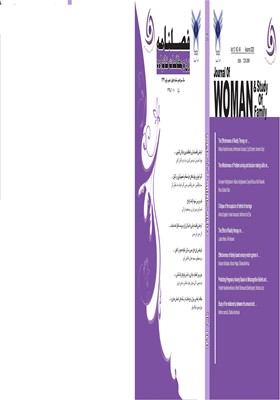اثربخشی بازی های حسی و حرکتی خانواده محور در کاهش نشانه های بالینی کودکان با اختلال نقص توجه/ بیش فعالی
الموضوعات : Woman and family
مریم مصطفوی
1
![]() ,
مسعود حجازی
2
,
غلامعلی افروز
3
,
مسعود حجازی
2
,
غلامعلی افروز
3
1 - دانشجوی دکتری، گروه روانشناسی و آموزش کودکان استثنایی، واحد علوم و تحقیقات ،دانشگاه آزاد اسلامی، تهران، ایران.
2 - استادیار، روانشناسی و آموزش کودکان استثنایی، دانشکده علوم انسانی، واحد زنجان ، دانشگاه آزاد اسلامی، زنجان، ایران (نویسنده مسئول)
Masod1357@yahoo.com
3 - استاد، گروه روانشناسی و آموزش کودکان استثنایی ، دانشکده روانشناسی و علوم تربیتی، دانشگاه تهران، ایران.
الکلمات المفتاحية: اختلال نقص توجه/ بیش فعالی, مداخلات خانواده محور, بازی های حسی و حرکتی,
ملخص المقالة :
پژوهش حاضر با هدف تعیین اثربخشی بازی های حسی و حرکتی خانواده محور در کاهش نشانه های بالینی کودکان با اختلال نقص توجه/بیش فعالی اجرا شد. این پژوهش از نوع نیمه آزمایشی با طرح پیش آزمون، پس آزمون و گروه کنترل است و جامعه آماری کلیه کودکان شهر زنجان در سال تحصیلی 96-97 (رده سنی 8 تا 11 سال)است. بر این اساس به صورت انتخاب تصادفی،4 مدرسه از ناحیه 1 و 2 شهر زنجان انتخاب و20 دانش آموزی که دچار اختلال نقص توجه/بیش فعالی بودند انتخاب شد. پس از یکسان سازی با توجه به متغیرهای سن، جنسیت و میزان اختلال نقص توجه/ بیش فعالی در دو گروه آزمایش(10نفر) و کنترل(10 نفر) قرار گرفتند. برای تشخیص نقص توجه/ بیش فعالی از پرسشنامه نسخه چهارم اسنپ و کانرز والدین استفاده شد. شرکت کنندگان در گروه آزمایش به مدت 8 هفته (16 جلسه 90 دقیقه ای) به همراه مادران در بازی های حسی و حرکتی خانواده محور شرکت کردند. داده ها با استفاده از تحلیل کوواریانس تحلیل شد و نتایج نشان داد که مداخلات انجام شده منجربه کاهش معنادار نشانه های بالینی کودکان با اختلال نقص توجه/ بیش فعالی (با شدت اثر 88/0) در گروه کنترل شده است. می توان نتیجه گرفت که این روش برای کمک به کاهش نشانه های نقص توجه/ بیش فعالی مناسب می باشد.
1) Abedi Shahabadi, S. Poormohammadrezaye Tajrishi, M. Mohammadkhani, P. Farzi, M. Effectiveness of Group Training Positive Parenting Program (Triple-P) on Parent-Child Relationship in Children with Attention Deficit/ Hyperactivity Disorders. Journal of Clinical Psychology. 2012; 3 (15); 63-75. [Persian].
2) Douglas, Ann. Parenting Through the Storm: Find Help, Hope, and Strength When Your Child Has Psychological Problems. The Guildford Press, New York. 2017.
3) Hill C, Waite P, Creswell C. Anxiety disorders in children and adolescents. Pediatrics and Child Health.2016; 26(12):548-53.
4) Chronis-tuscano,A,M., Lewis-Morraty,E,woods , k ,o'Brien,K,A., Mazursky-Horowitz, H., & Thomas, S.R.. (2014).
5) Bratton, S.C., & Dafoe, E.C. Play therapy-encyclopedia of mental health (second edition). 2016. 278- 283.
6) Ferreira, J.M., Makinen, M., & Amorim, K.D.S. Intellectual disability in kindergarten: possibilities of development through pretend play. Procedia-social and Behavioral Sciences. 2016. 217(1): 487-500.
7) Halperin, J.M., & Healey, D.M. The influence of environment enrichment, cognitive enhancement, and physical exercise on brain development: can we alter the developmental trajectory of ADHD. Neuroscience and Bio Behavioral Reviews, 2011. 35(1): 621-634.
8) Yuen, T., Landreth, G., & Baggerly, J. Filial therapy with immigrant Chinese families. International Journal for Play Therapy, 2002. 11(2), 63-90.
9) Barkley. R. A. Deficient emotional self-regulation is a core symptom of ADHD. 2013.
10) Landreth,G. Bratton, S. (2006). Child parent relationship therapy (CPRT): A 10-session filial therapy model. Newyork: Routledge.
11) RajabPoor, M. Makvand Hosseini, Sh. RafieNia, P. Effectiveness of group therapy on parent-child relationship on preschool children's aggression. Journal of clinical psychology. 2012; 4 (3). [Persian].
12) Rahimi Pardanjani, S. Ghobari Bonab, B. Afrooz, Gh. Faramarzi, S. Effectiveness of timely family-based intervention based on localized play therapy on clinical symptoms in children with attention deficit / hyperactivity preschool. Journal of family research. 2016; 45 (12); 53-68. [Persian].
13) PeimanNia, B. PoorSharifi, H. Mahmood Alilof, M. Determining the effectiveness of parent-child relationship group therapy on improving the symptoms of conduct disorder in primary school children in Ahvaz. Journal of psychological achievements. 2013; 2 (4); 141-160. [Persian].
14) Taklavi, S. The effect of mothers' play therapy training on children's behavioral problems with learning disabilities. Journal of learning sidabilities.. 2011; 1 (1); 44-59. [Persian].
15) Ganji, K. Zabihi, R. Khodabakhsh, R. Croskian, A. Effectiveness of Child-Based Play Therapy in decrease of behavioral symptoms of ADHD children. Journal of clinical psychology. 2011; 4 (3); 15-25. [Persian].
16) HosseinZadeh Maleki, Z. Mashhadi, Ali. SoltaniFar, A. Moharreri, F. Ghanayi ChamanAbad, A. Working memory training, Barclays parental education program and the combination of these two interventions on improving working memory of children with attention deficit / hyperactivity disorder. Journal of Cognitive science news.. 2013; 15 (4); 53-63. [Persian].
17) Ratey, J. J, & Hagerman, E. Spark: The Revolutionary New Science of Exercise and the Brain. New York: Little, Brown and Company. 2008.
18) Rezazadeh, M. Kalantari, M. Neshatdoost, H. The impact of educational games on focusing attention on reducing the severity of attention deficit disorder / hypoxia disorder. Journal of psychology. 2007; 11 (3); 352-337. [Persian].
19) Sadr Alsadat, S.J. Houshyari, Z. Sadr Alsadat, L. Determination of psychometrics index of SNAP-IV rating scale in parents execution. Journal of Rehabilitation. 2008. 3(31). 59-65. [Persian].
20) Barkley. R. A. Behavioral inhibition, sustained attention, and executive functions: Constructing a unifying theory of ADHD. Psychological Bulletin, 1997. 121(1), 65-94.
21) Barkley. R. A. Journal of ADHD and the nature of self-control. New York: Guilford. 2005.
22) Landreth,G. Play therapy: The art of the relationship. NewYork. NY: Routledge. 2002.
23) Luchrino.L., Mancini, F., & Mercurio, C. Parent-training intervention among a group of children with ADHD Child and Adolescent Psychiatry.2011. 4(1): 397-398.
24) MR coleman, G Gallagher, S Kirk. Children exceptional Educating;Elsevier:York new
25) Andrea C-T. Erin, L. Sharon R. Th. Parent-child interaction therapy with emotiom coachingfor preschoolers with ADHD disorder. Journal of Cognitive and behavioral practice, 2016. 23(1) 4-17.
_||_

